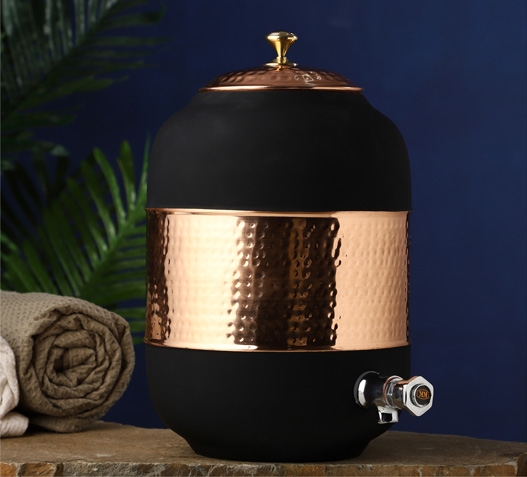Leading Trends in Home Decor Featuring Stylish and Useful Copper Products
Leading Trends in Home Decor Featuring Stylish and Useful Copper Products
Blog Article
Discovering the Diverse Applications of Copper Products in Modern Industries
From enhancing the efficiency of electrical systems to playing an important function in sustainable power technologies, the adaptability of copper is apparent. As industries progressively focus on development and sustainability, the diverse applications of copper necessitate a closer exam, specifically regarding their possible influence on future environmental techniques and technical improvements.
Electric Applications of Copper
Copper is a necessary material in the electrical industry, accounting for around 60% of the complete need for non-ferrous metals globally - Copper Products. Its exceptional electrical conductivity, which is almost two times that of aluminum, makes it the recommended option for a vast array of electrical applications. From wiring systems in business and residential buildings to high-voltage power transmission lines, copper makes sure effectiveness and integrity in electrical power delivery
Along with circuitry, copper is essential to the manufacturing of electric components such as generators, transformers, and electric motors. These components take advantage of copper's thermal conductivity and malleability, essential for warmth dissipation and effective performance. In addition, copper's resistance to deterioration enhances the life-span and sturdiness of electric systems, making it an affordable service in the lengthy term.
The growth of renewable resource sources, such as solar and wind power, has additionally enhanced the need for copper in electrical applications. As markets transition in the direction of lasting power services, copper's role ends up being a lot more crucial. On the whole, the flexibility and efficiency features of copper solidify its status as a cornerstone material within the electric industry, driving development and efficiency across various applications.
Plumbing and Piping Solutions
In modern-day plumbing systems, the option of products substantially influences both performance and long life. Copper has arised as a preferred choice due to its distinct residential or commercial properties, consisting of corrosion resistance and antimicrobial qualities. These characteristics make certain that copper piping continues to be risk-free and durable for transferring potable water, an essential consideration in residential and business applications.
Among the essential benefits of copper in pipes is its capability to hold up against heats and pressures, making it appropriate for a range of applications, from warm water systems to heating and cooling down networks. Furthermore, copper's flexibility enables less complicated installment in complicated piping formats, lowering the danger of failures and leakages.
Another noteworthy advantage is copper's lengthy lifespan, frequently going beyond half a century with appropriate maintenance. This long life not only decreases replacement prices yet also adds to sustainable practices by minimizing waste. In addition, copper's recyclability aligns with modern ecological standards, advertising a round economic situation within the pipes sector.
Copper in Renewable Energy
The adaptability of copper extends past pipes applications, playing a vital role in the renewable resource market. Its superb electric and thermal conductivity makes it a necessary product in the manufacturing and circulation of renewable power resources, especially solar and wind power. In solar panels, copper is utilized in photovoltaic or pv cells and circuitry, assisting in effective power conversion and transmission. Its resistance to rust guarantees lasting performance, which is important for taking full advantage of energy outcome with time.

In addition, as the worldwide need for electrical automobiles (EVs) increases, copper's role in battery systems and billing facilities comes to be a lot more significant. The material's capability to perform electrical hop over to here energy efficiently is essential to the efficiency of EV batteries, boosting variety and billing rate.
Copper's Function in Electronics
Electronics producing relies heavily on copper's outstanding homes, specifically its high electric conductivity and thermal efficiency. These characteristics make copper a suitable selection for a wide variety of electronic parts, consisting of ports, circuit card, and circuitry. The steel's capability to successfully send electrical signals makes sure marginal energy loss, which is critical in high-performance digital tools.
Additionally, copper's thermal conductivity plays a significant duty in heat dissipation, protecting sensitive components from overheating. This is especially vital in contemporary electronics, where portable designs lead to enhanced heat generation. Copper is additionally favored for its malleability and ductility, permitting it to be easily shaped right into intricate designs that meet the needs of sophisticated digital applications.
With the rise of consumer electronics, telecommunications, and electric lorries, the demand for copper in the electronic devices industry continues to grow. As developments in innovation progress, copper continues to be essential to achieving higher efficiency and reliability in digital products. Its recyclability further enhances its appeal, as manufacturers look for sustainable options without jeopardizing high quality. Thus, copper remains a foundation material in the ever-expanding field of electronics.
Cutting-edge Uses in Production

One remarkable application is in additive production, where copper-based materials are employed in 3D printing procedures. This enables the click here for more development of intricate geometries and lightweight parts, especially in the aerospace and automobile fields. In addition, copper's thermal conductivity makes it an optimal selection for warm exchangers, boosting effectiveness in industrial air conditioning systems.
Furthermore, the rise of wise manufacturing has seen the consolidation of copper in IoT tools, where its conductive capabilities support innovative noticing modern technologies. In the realm of sustainable energy, copper is pivotal in the manufacturing of photovoltaic panels and wind generators, assisting in more effective energy conversion and circulation.
As industries pursue sustainability and technology, copper's flexibility and efficiency remain to place it as a vital product, driving innovations in manufacturing and adding to the development of smarter, much more reliable products.
Conclusion
In recap, copper items demonstrate remarkable flexibility throughout different modern sectors. Copper Products. Their exceptional conductivity boosts electrical applications, while rust resistance makes sure reliability in plumbing. The indispensable function of copper in renewable resource and its crucial feature in electronic devices highlight its significance ahead of time lasting practices. Additionally, ingenious usages in making emphasize copper's adaptability and withstanding significance. Collectively, these applications illustrate copper's essential payment to technological progression and industrial efficiency in modern culture.
From enhancing the effectiveness of electric systems to playing a vital role in renewable power innovations, the convenience of copper is noticeable. As industries increasingly focus on advancement and sustainability, the diverse applications of copper call for a closer examination, particularly regarding their prospective effect on future environmental methods and technological advancements.
The growth of renewable energy sources, such as solar and wind power, has better boosted the need for copper in electric applications. In general, the flexibility and efficiency characteristics of copper solidify its condition as a keystone material within the electrical sector, driving technology and effectiveness across different applications.
The convenience of copper expands past pipes applications, playing a crucial function in the eco-friendly energy market.
Report this page